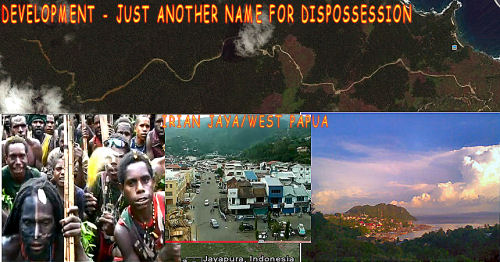Torture in West Papua consequence of overpopulation and colonialism in Indonesia
Indonesian President Yudhoyono failed to board a flight to the Netherlands at the last moment because he had been warned that human rights groups had organised to have him arrested for alleged human rights abuses, this October 2010. New portable technology means that the violent oppression of West Papuan people whilst their land is stolen off them by new immigrants is no longer able to be concealed from the world. West Papuans are simply fighting against development - i.e. the insertion by town planners of new suburbs and populations into land inhabited for thousands of years by respectable swidden farmers.

Dispossession by any other name
Informed of this incident, Indonesian Foreign Minister Marty Natalegawa admitted it but said that the policy has changed from a "so-called security approach" to a "prosperity approach".
But dispossession, by any other name, must still entail violence. And there is no way that you can go in and take a clan's access to land they have held for thousands of years without killing them, either violently as you encounter their resistance, or slowly, through starvation and marginalisation. This 'prosperity' approach must be a very one-way kind.
Under Indonesia's policy of 'transmigration' armed forces are sent into forested areas to dispossess by force those who have lived in them for thousands of years. Primary industry, in the form of mines and timber-works, leads the charge, followed by the property developers, who build suburbs, and after this, Indonesians from urban centres in other parts of Indonesia purchase houses there and migrate.
Because there was a 'legal' arrangement in the 1960s, with the help of the UN, Indonesia can claim the 'legal' right to resettle millions of people in West Papua, over the dead bodies of the incumbent inhabitants. Shows you how little what's legal has to do with justice, doesn't it? Because West Papua is supposed to be Indonesian, what the armies and property developers do there can be politely recast as 'town planning' and invasion from other parts of Indonesia by millions of people can be called a 'sea change'. If it were not for armies and property developers which facilitate this legal invasion, of course, there would not be torture and genocide in Western Papua. Whilst torture and genocide are still illegal, the things that lead up to them - growth lobbies, growth economics, globalisation, industrial agriculture, smart growth, population 'building', property development, mining etc., and corporate colonisation, are legal. Once you create the problem legally, the illegal consequences become irresistable.
British film about West Papuan resistance fighters:
The modern day rise in large scale monocrop plantations such as palm oil and bananas, proposed for vast swathes of Dayak land held under customary rights, titles and claims in Indonesia, threaten the local political landscape in various regions in Borneo. Further problems continue to arise in part due to the shaping of the modern Malaysian and Indonesian nation-states on post-colonial political systems and laws on land tenure. The conflict between the state and the Dayak natives on land laws and native customary rights will continue as long as the colonial model on land tenure is used against local customary law. The main precept of land use, in local customary law, is that cultivated land is owned and held in right by the native owners, and the concept of land ownership flows out of this central belief. This understanding of t is based on the idea that land is used and held under native domain. Invariably, when colonial rule was first felt in the Kalimantan Kingdoms, conflict over the subjugation of territory erupted several times between the Dayaks and the respective authorities. ( From "Dyak people," Wikipedia.
Australian news report on genocide in West Papua
Jayapura: Indigenous West Papuans riot over Indonesian copper and gold mine ownership, March 2006
Jayapura is the largest town in Irian Jaya/West Papua. It has beautiful beaches and sprawling suburbs, and a long road out into the hinterlands promises many more years of violent dispossession if allowed to go ahead.

Recent comments